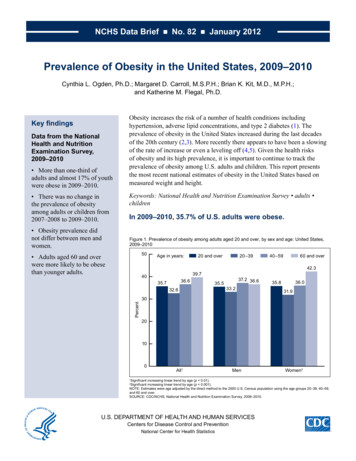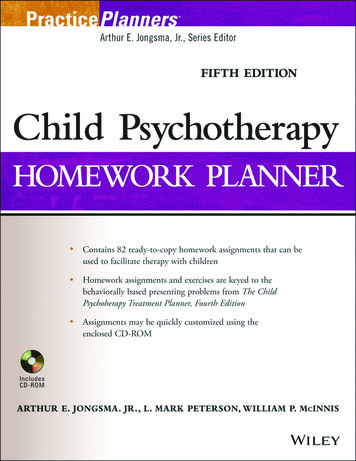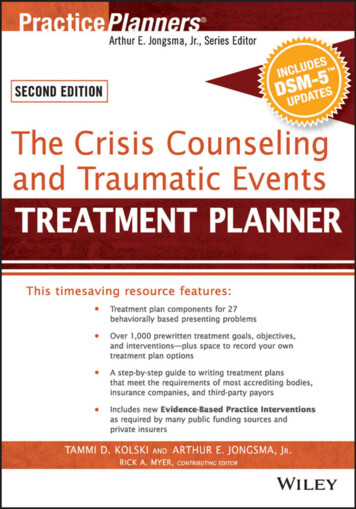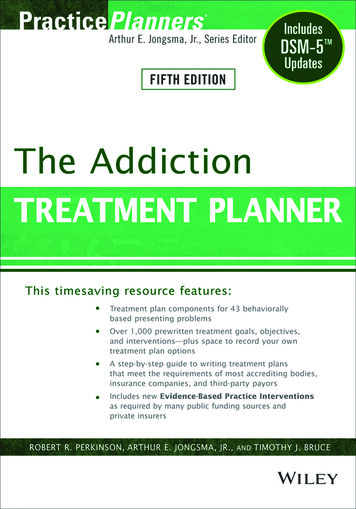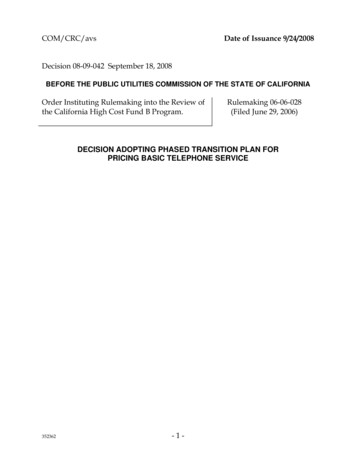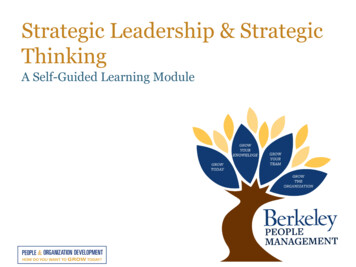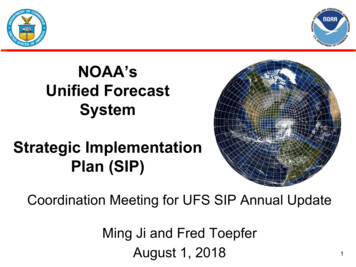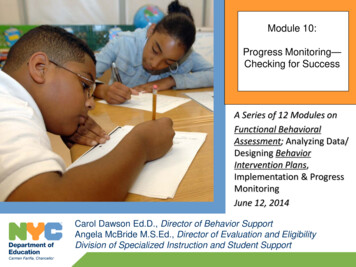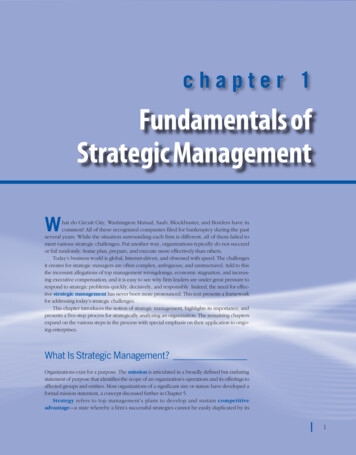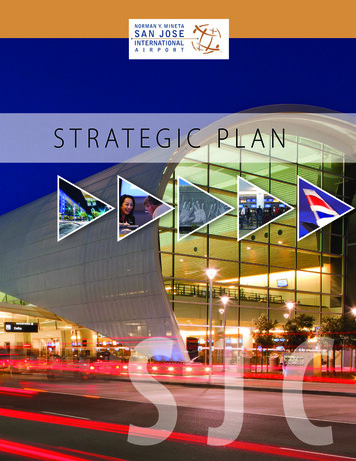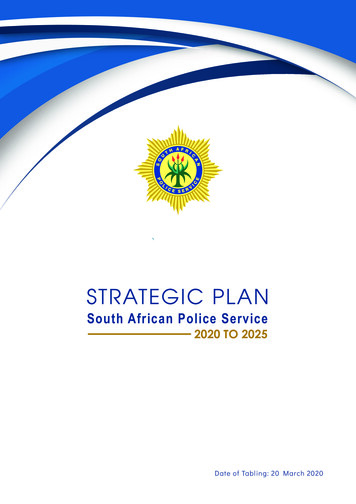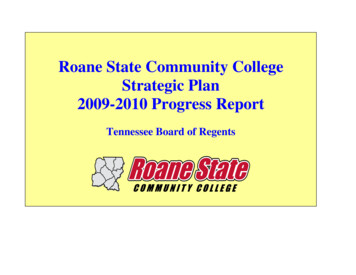
Transcription
Roane State Community CollegeStrategic Plan2009-2010 Progress ReportTennessee Board of Regents
Roane State Community CollegeStrategic Plan 2005-2010Progress Report 2009-2010LEADERSHIPRSCC Strategic Leadership Goal:1. As the higher education center of choice for its service area, Roane State Community College will demonstrate patternsof evidence attesting to its leadership in promoting and communicating the value and benefits of higher education to theeconomic development and quality of life for the citizens of its communities.Rationale:The broad scope of this goal enables the college to serve students and service area residents across multiple dimensions not only bybringing them to the college for learning and for service but also by reaching out into the community to address wider educationalneeds. Roane State serves a diverse eight-county area representing the highest and lowest extremes on the Educational NeedsIndex, THEC’s study demonstrating the link between educational attainment and social welfare. Through the objectives developed tomeet this goal, the college strives to raise the educational level of its neediest communities as well as enhance the progress made inits counties with a longer and richer history of educational attainment.RSCC Objectives for Leadership Goal:Measurable Objectives: 1.1 P-16 – Best Practices WorkshopsThrough Roane State Community College’s leadership for the Big South Fork P-16 Council, 100% of the school systems in theeight-county service area will participate in Best Practices Workshops.Owners: VP of Student Learning, Chair P-16 Council2004-05 Base Year Objective Baseline2005-06 projected progressProgress status as of 06/30/06Contact initiated with state Outstanding Administrator and Principal from Kingston Elementary School(one of top eight in the state) for development of workshopWorkshop developed and implemented; 50% of service area K-12 school systems will attend.Due to retirement of Kingston Elementary Principal, this objective took a different directionthrough the leadership of the Big South Fork P-16 Council, the Big South Fork Tech-PrepConsortium, and RSCC Assistant Professor Dr. Michael Mueller. A Symposium on PowerfulTeaching was conducted at Roane State on April 1, 2006. More than 200 participants shared ideas1
2006-07 projected progressProgress Status as of 06/30/072007-08 projected progressProgress Status as of 06/30/082008-09 projected progressProgress Status as of 06/30/09and best practices and planned a community approach to professional development. Participantsrepresented 66% of service area school systems.Additional best practice training for K-12 teachers included: (1) professional developmentworkshop for RSCC faculty and area high school science and math teachers – presented by Dr.Marilyn Barger, director of FLATE, Florida regional center for manufacturing education and (2)Morgan County P-16 best practice workshop in science education and technology integration.% attainment of 2005-2006 benchmark: 100%; 50% benchmark, 66% participation75% of service area school systems will attend planned workshops; best practice resources will beprovided to all participants. Analysis of participant feedback will be used for continuous workshopenhancement.Teacher Symposium was deferred until September 29, 2007 in order to re-group after RSCC’ssymposium faculty coordinator left the institution. The upcoming symposium will feature Dr.Marsha Gordon, Wiley Publishing, “New Technologies for Constructing Learning Environments.”Other K-12 teacher training included:Training for Scott County teachers in two-way audio/video interactive instructionTraining for high school health science teacher through Teacher Educator grant to RSCCContinuing Education division. Approximately 60 teachers from across the stateparticipated in workshops on biotechnology education, innovative teaching techniquesfor health sciences, and various types of therapeutic rehabilitation.RSCC Corporate Training Center also trained 60-70 teachers and administrators from theOak Ridge Schools on Microsoft Office applications% attainment of 2006-2007 benchmark: 100% despite deferral of proposed teacher symposium100% of service area school systems will participate in best practices workshops1. Symposium on Powerful Teaching was held September 29, 2007. Over 120 area teachersattended 35 sessions on themes ranging from technology in the classroom to innovativeteaching styles. Dr. Marsha Gordon of Wiley Brothers, Inc. Publishers, was the keynotespeaker. She engaged the audience in an interactive presentation regarding multiplelearning styles. Seven of eleven RSCC service area school systems participated (64%)plus an additional two out-of-area school systems.2. RSCC Continuing Education division was awarded a TN Dept. of Education grant to serveas state-wide coordinator for teacher training for high school allied health teachers.Approximately 135 teachers participated in professional development workshops, handson labs, and presentations by physicians, pharmacists, and a 3D imaging expert.3. The Continuing Education division also partnered with the local Farm Bureau and theRoane County 4-H to offer an all-day, hands-on agricultural experience for over 400 3rdgrade students and teachers.% attainment of 2007-2008 benchmark: 100%Increase workshop opportunities for sharing of best practices with P-16 partners1. 3rd Symposium on Powerful Teaching held November 15, 2008. Over 150 area teachers,administrators and education students attended.2. Through Perkins funding RSCC conducted four information sharing sessions inDecember 2008 with high school administrators and LEA supervisors. Three high schoolsand two LEAs were represented at the Cumberland Mountain State Park with 17participants; 4 high schools and 3 LEAs attended the session at Rugby with 20 totalparticipants; 5 high schools and one LEA attended the Roane County session with 20participants and 7 high schools and 4 LEAs participated in Oak Ridge with 282
2009-10 projected progressProgress Status as of 06/30/10participants. (19 of 23 high schools participated 83% and 10 of 12 LEAs attended again at83%) The sessions included presentations from TBR staff regarding the resourcesavailable through TCIDS and from the SBE health science consultant about the mandatedprograms of study. Dual enrollment and dual credit policies and procedures wereaddressed as well as specifics about AAS programs in early childhood education,criminal justice, emergency management services, health information technology andbusiness.3. In January RSCC hosted the East TN Regional CTE Directors meeting with presentationsaddressing articulation/dual credit/dual enrollment, criminal justice programopportunities, online and distance learning programs, TCIDS, a state update and E-Tigerreporting. Twenty three participants represented 15 counties in addition to SBE, TBR andRSCC staff.4. The Roane County Career & Technical Education Teacher Staff Development was held atRSCC in February with 26 participants from all five high schools in the county.% attainment of 2008-2009 benchmark: 100%Increase workshop opportunities for sharing of best practices with P-16 partnersBig South Fork Regional P-16 Council meeting was held in February 2010. The Council will bemore active in promoting connections with area workforce leaders. Two major projects wereidentified, to be worked on for implementation during the 2010-11 year: (1) job shadowingopportunities for public school teachers and students in companies and businesses (STEM wherepossible) for real-world experience; and (2) development of a best practices repository on theRSCC web page.% attainment of 2009-2010 benchmark: 100%Measurable Objectives: 1.2 P-16 - ArticulationTo increase by at least one per year the number of articulations and/or transfer agreements with 4-year public and privateinstitutions in Tennessee.Owners: Articulation Coordinator; Tech Prep Coordinator2004-05 Base Year Objective Baseline2005-06 projected progressProgress status as of 06/30/062006-07 projected progressProgress status as of 06/30/072007-08 projected progressProgress Status as of 06/30/08RSCC has articulation agreements with UTK, TTU, ETSU, LMU, Tusculum, and Trevecca Nazarene andcourse-by-course equivalency tables with APSU, ETSU, LMU, MTSU, TTU, TN Wesleyan, U of M, UTC,UTK, and UTM.Add at least one articulation or transfer agreementAdded 2 2 agreement in elementary education with TTU for Roane County campus. Programsalso added with Tusculum and LMU.% attainment of 2005-2006 benchmark: 100%Add at least one articulation or transfer agreementAdded articulation agreements with ETSU in Nursing and Music; added articulation agreementwith Savannah College of Art and Design; agreements in progress include: Maryville College, TNWesleyan, Carson Newman.% attainment of 2006-2007 benchmark: 100%Add at least one articulation or transfer agreementAdded articulation agreements with Strayer University and Maryville College; completed3
course equivalency tables with Carson Newman and TN Wesleyan; added 4 newarticulated programs with UT/Chattanooga and developed Engineering Transfer Guidewith UT/Knoxville.% attainment of 2007-2008 benchmark: 100%2008-09 projected progressProgress Status as of 06/30/092009-10 projected progressProgress Status as of 06/30/10Add at least one articulation or transfer agreement New transfer equivalency table was established with Tennessee Wesleyan College. Initialnegotiation for articulation agreements is in development. Anticipated completion date:May 2009. ETSU has developed additional articulation agreements for RSCC students. Due tochanges on their website, these have not yet been “released” to the general public. Also,new articulated programs will be developed for Exercise Science and Criminal Justice.% attainment of 2008-2009 benchmark: 100%Add at least one articulation or transfer agreement Articulation agreements are in the process of being updated for 2010-11 for UTK, TTU,ETSU. Provided bus tours to TTU and UTK for RSCC students Increase in the number of exhibitors for the College Transfer Fair. An agreement was established with Lipscomb University and major revisions were madeon the LMU agreement for 2010-11. New programs added include: Criminal Justice and Early Childhood Education for ETSU,Wildlife and Fisheries for UTK, Articulation of AA/AS and AAS degrees to BethelUniversity. During fall 2009, the Academic Deans and Director of Advising/Articulation participated inreview of the “Areas of Emphasis” for the transfer program and in response to highereducation legislation. Additional coordination will occur during the summer as the statenegotiates common curriculums for University Transfer Programs. Roadmaps were developed for the following Transfer Program areas: Pre-Medical/Vet,Pre-Pharmacy/Chemistry/Biology, Nursing, Education, Radiology, Business, Engineering,Computer Science. Completed revision of the University Transfer Program section of the Roane StateCatalog for 2010-11.% attainment of 2009-2010 benchmark: 100%Measurable Objectives: 1.3 P-16 – Technology AcademyTo demonstrate leadership for the development and implementation of new Technology Academy at Oak Ridge High School;articulate credits for all established tracks.Owners: Dean of Allied Health Sciences, Dean of Social Science, Business & Education, VP of ORBC and Satellite Centers2004-05 Base Year Objective Baseline2005-06 projected progressProgress status as of 06/30/06RSCC and ORHS have begun planning discussions for Medical Academy for health science careerpathways integrated with academic curriculum; Russ Schubert has been working extensively with ORHSon their IT AcademyAssist with development of classroom design, lab skills, and curriculumRSCC Dean of Health Sciences traveled with representatives from ORHS to study best practices at4
2006-07 projected progressProgress status as of 06/30/072007-08 projected progressProgress Status as of 06/30/082008-09 projected progressProgress Status as of 06/30/092009-10 projected progressProgress Status as of 06/30/10Medical Academy in a high school in Florida; assisted with development of curriculum, skills, andclassroom design.In addition, visits were made to manufacturing and arts academies. RSCC Dean of Oak RidgeBranch Campus working with ORHS on Manufacturing and Engineering Technology Academy.140 ORBIT Academy students, faculty, and chaperones were hosted on the Roane State OakRidge Branch Campus in March, 2006.% attainment of 2006-2006 benchmarks: 100%RSCC and ORHS continue interaction for all existing and developing academies.RSCC Vice President of Oak Ridge Branch Campus continued to work with ORHS ORBIT andEngineering & Manufacturing Academies. Served on the visiting team for the High Schools ThatWork initiative of the SREB, and the advisory committees of both academies. Hosted over 60ORBIT Academy students and faculty for a series of technology and business presentations and atour of the facilities.% attainment of 2006-2007 benchmark: 100%RSCC and ORHS continue interaction for all existing and developing academies.RSCC Vice President of ORBC and Campus Centers continued to support the ORHS ORBITAcademy by serving on their advisory committee. Oak Ridge High School slowed academyexpansion during construction of their new building this year. Activity expected to acceleratenext year.% attainment of 2007-2008 benchmark: 100%RSCC and ORHS continue interaction for all existing and developing academies.RSCC Vice President of ORBC and Campus Centers continued to support the ORHS ORBITAcademy by serving on their advisory committee. No new activity on the part of the high school.Current VP of ORBC and Campus Centers retired at the end of 2009 academic year; new VP willinitiate interaction with Gayle Ward, Assistant Principal, lead contact for high school academyactivities.% attainment of 2008-2009 benchmark: 100%RSCC and ORHS continue interaction for all existing and developing academies.During 2009-2010, the focus of interaction with Oak Ridge High School has shifted to discussionfor increasing dual studies offerings. During the 2009-2010 academic year, three Early ChildhoodEducation (ECED) courses and the Medical Terminology course (from the Health InformationTechnology) program were offered at ORHS. (A fourth ECED course is planned for springsemester 2011)% attainment of 2009-2010 benchmark: 100% for substantive interaction with ORHS for articulatedopportunities.Measurable Objectives: 1.4 P-16 – Resource SharingTo improve resource sharing among service area educators through development of P-16 webpage to serve as an online referencelibrary for P-16 Council members, RSCC, and TTC faculty and staff, and area school officials.Owners: VP Student Learning, Chair P-16 Council2004-05 Base Year Objective BaselineHard copy reference library initiated5
2005-06 projected progressProgress status as of 06/30/062006-07 projected progressProgress status as of 06/30/072007-08 projected progressProgress Status as of 06/30/082008-09 projected progressProgress Status as of 06/30/092009-10 projected progressProgress Status as of 06/30/10Establish web page; notify 100% of K-12 schools and TTC’s in the service areaWeb page format has been developed; however, release has been delayed due to total re-designof RSCC webpage. In the meantime, hard-copy communication with service area high schoolscontinues. Four years of data on all schools in the service area has been established. Studentsare tracked to see if they are enrolled; have graduated; and what their majors are. This data isupdated each year with new students added.% attainment of 2005-2006 benchmark: 50%Update webpage; continue to provide student data to area high schoolsData was provided to each high school in the RSCC service area on their students who hadgraduated the previous spring and attended RSCC. The previous five years of data were updated.Roane County Schools used the data to support establishment of a four-year math curriculum.Several other schools used the data for their annual planning and reporting.The P-16 webpage includes a list of local council members, meeting agendas and minutes,projects and publications, and links to the TN P-16 and the Imagination Library.% attainment of 2006-2007 benchmark: 100%Update webpage; continue to provide student data to area high schoolsData on 2007 high school graduates enrolled at RSCC in 2007 fall was provided to each highschool and Director of Schools in the RSCC service area again this year. The data continues to beuseful to most of the school systems. RSCC’s Enrollment Management Office now has sevenyears of this data. Webpage has been updated with current year meeting agendas, minutes andprojects% attainment of 2007-2008 benchmark: 100%Survey schools regarding webpage effectiveness; contact service area high schools to determine if dataneeds have changed and RSCC’s ability to provide different sorts of dataData on 2008 high school graduates enrolled at RSCC in 2008 fall was provided to each servicearea high school and Director of Schools. The information was also posted on the EnrollmentManagement web page.Survey questions have been developed and will be sent to schools. Responses will be analyzedduring summer with appropriate adjustments made to the data reports in fall 2009.% attainment of 2008-2009 benchmark: 100%Update webpage based upon survey results; provide service area student data determined as feasible inprevious year survey.VP for Student Learning Chris Whaley took over facilitation of Big South Fork P-16 Council spring2010. Current major initiatives include RSCC hosting of web page to catalogue best educationalpractices that P-16 members can access and add to. A second ongoing initiative is to identify jobshadowing opportunities for area teachers and students, particularly in STEM area to promote onsite/real world learning. Dr. Whaley’s plans for future initiatives include: discipline-specific roundtable discussions between RSCC and high school faculty to share ideas about what studentsneed to be successful and scheduled opportunities for high school students to visit RSCC andTTC campus classes for programs they are interested in.% attainment of 2009-2010 benchmarks: 100%6
Measurable Objectives: 1.5 P-16 – Communication PlanTo demonstrate evidence of leadership to promote and communicate the value of higher education to external constituencies bydeveloping and implementing an annual action plan for communicating with legislators and community groups.Owners: RSCC President , VP Oak Ridge & Satellite Centers, Director of Workforce Connections2004-05 Base Year Objective Baseline2005-06 projected progressProgress status as of 06/30/062006-07 projected progressProgress status as of 06/30/072007-08 projected progressProgress Status as of 06/30/08President and executive council members maintain memberships in and speak to civic groups,communicate through written publications, and meet with legislators formally and informallyAction plan developed with benchmarks for number of staff maintaining civic memberships, regularlyscheduled speakers bureau, and scheduled communication with legislatorsRSCC developed a community/legislative communication plan that includes:1. Conduct Legislative Luncheons prior to the beginning of the upcoming session to informlegislators in the service area about RSCC plans and needs.2. Individual meetings between RSCC president and area legislators.3. Letters of appreciation from RSCC president to area legislators for support of highereducation.4. Restructuring and marketing of RSCC Speakers’ Bureau.5. Encouragement of faculty and staff to speak to community groups; Public Relations todevelop plan to track employee presentations.6. Use of P-16 to communicate stay-in-school message at K-12 level, value/importance ofpostsecondary education.% attainment of 2005-2006 benchmark: 100%Implement action plan.The following plan initiatives were implemented in 2006-07:1. Conduct Legislative Luncheons prior to the beginning of the upcoming session to informlegislators in the service area about RSCC plans and needs.2. Individual meetings between RSCC president and area legislators.3. Letters of appreciation from RSCC president to area legislators for support of highereducation.4. Restructuring and marketing of RSCC Speakers’ Bureau.5. Encouragement of faculty and staff to speak to community groups; Public Relations todevelop plan to track employee presentations.6. Use of P-16 to communicate stay-in-school message at K-12 level, value/importance ofpostsecondary education.% attainment of 2006-2007 benchmark: 100%Implement action planThe following plan initiatives continued in 2007-08:1. Conducted legislative luncheons prior to the beginning of the upcoming session toinform legislators in the service area about RSCC and TBR plans and needs.2. Held individual meetings between RSCC president and area legislators.3. Sent letters of appreciation from RSCC president to area legislators and communityleaders for support of higher education.4. Marketed RSCC Speakers’ Bureau.5. Encouraged faculty and staff to speak to community groups; RSCC Public Relationsdeveloped and implemented a plan to track employee presentations.6. Used P-16 through poster campaign, video presentation, and the P-16 web page to7
2008-09 projected progressProgress Status as of 06/30/092009-10 projected progressProgress Status as of 06/30/10communicate the stay-in-school message at K-12 level and the value/importance ofpostsecondary education.7. RSCC Education program faculty and students participated in TBR Legislative Day inNashville, demonstrating educational technology associated with the 2 2 program withTTU in elementary education8. RSCC Continuing Education staff attend and/or present regularly to area business,industry, and community groups (Human Resource associations, Plant Manager groups,Chamber of Commerce functions, Rotary, Kiwanis, etc.)9. Adult Education division staff meet regularly with local Literacy Councils.% attainment of 2007-2008 benchmark: 100%Implement action plan1. RSCC staff and faculty attend and/or make presentations regularly to area business,industry, and community groups (Human Resource associations, Plant Manager groups,Chamber of Commerce functions, Rotary, Kiwanis, etc.); 185 speaking engagementstraced for 2008-2009.2. Adult Education division staff meet regularly with local Literacy Councils.3. Implemented weekly updates on RSCC program offerings to nine WIA offices in LWIA 4service area.4. Corporate Training Center sends quarterly email newsletter to its contact list.5. Leadership Roane County hosts a Local Government Day with all local officials as well asvisits Nashville in order to meet with our local legislators to discuss local issues.6. RSCC president conducted legislative luncheon prior to beginning of legislative sessionto inform area legislators of RSCC/TBR plans and needs.7. RSCC president held individual meetings with area legislators and sent letters ofappreciation for support of higher education.8. Continued P-16 stay-in-school campaign through poster, video presentation andwebpage.% attainment of 2008-2009 benchmark: 100%Implement action plan1. RSCC staff and faculty attend and/or make presentations regularly to area business,industry, and community groups (Human Resource associations, Plant Manager groups,Chamber of Commerce functions, Rotary, Kiwanis, etc.); 96 speaking engagementstracked for 2009-2010.2. Adult Education division staff members meet regularly with local Literacy Councils.3. Worked closely with WIA offices to partner for mutually beneficial grant opportunities.4. RSCC president conducted legislative luncheon prior to beginning of legislative sessionto inform area legislators of RSCC/TBR plans and needs.5. RSCC president held individual meetings with area legislators and sent letters ofappreciation for support of high education.6. RSCC president attended Legislative Day on the Hill with the Roane County Chamber ofCommerce.7. Continued to host/sponsor Big South Fork P-16 meetings.% attainment of 2009-2010 benchmark: 100%Measurable Objectives: 1.6 Workforce Development – Job Placement8
Increase to 80% the number of programs with job placement rate of 90% or better; maintain placement rate of 92% or higherthroughout the planning period.Owners: Placement Coordinator, Program Directors, Deans2004-05 Base Year Objective BaselineIn 2003-2004, 15 of 26 career programs had job placement rates of 90% or better.2005-06 projected progressProgress status as of 06/30/06Increase by 10% programs with rates of 90% or higher19 programs attained placement rate of 90% or better; increase of 27%; overall placement rate of96% as reported to THEC% attainment of 2005-2006 benchmark: 100%Increase by 10% programs with rates of 90% or higher; maintain 92% placement rate or higher2006-07 projected progressProgress status as of 06/30/072007-08 projected progressProgress Status as of 06/30/082008-09 projected progressProgress Status as of 06/30/092009-10 projected progressProgress Status as of 06/30/1018 programs attained placement rate of 90% or better; decrease of 5%; overall placement rate of93% as reported to THEC% attainment of 2006-2007 benchmark: 50%80% of programs have rates of 90% or higher; maintain 92% placement rate or higher22 of 27 programs attained placement rate of 90% or better (increase of 22% over previous year);overall placement rate of 94% reported to THEC% attainment of 2007-2008 benchmark: 100%80% of programs have rates of 90% or higher; Maintain 92% overall placement rate or higher19 of 26 (73%) programs attained placement rate of 90% or better; overall placement rate of 97%as reported to THEC.% attainment of 2008-2009 benchmarks: 50% (overall rate benchmark met; % programs @80% notmet.80% of programs have rates of 90% or higher; Maintain 92% overall placement rate or higher16 of 25 (64%) programs attained placement rate of 90% or better; overall placement rate of 97%as reported to THEC.% attainment of 2009-2010 benchmarks: 50% (overall rate benchmark met; % programs @80% notmet.Measurable Objectives: 1.7 Workforce Development- Jobs CabinetTo expand Jobs Cabinet and/or community workforce needs survey to all counties in the service areaOwners: RSCC President, VP of Student Learning, Director of Workforce Connections2004-05 Base Year Objective BaselineJobs Cabinet meetings initiated between Roane County educators and business representatives2005-06 projected progressRevisit Jobs Cabinet mission and purpose, continue meetings with Roane County cabinet, develop list ofbusiness representatives for Anderson County Jobs Cabinet and initiate first meeting; pilot workforceneeds survey in Fentress, Cumberland, and Morgan countiesThe planned focus for Jobs Cabinet meetings in Anderson and Loudon counties had beenthrough the Career Centers which RSCC operated under subcontract for WIA. Because of thecollege’s decision not to continue to serve as operators of the Career Centers, another plan toassess workforce needs will need to be developed, especially since the original Roane CountyJobs Cabinet was not an effective means of ongoing communication. In the meantime, the P-16Progress status as of 06/30/069
2006-07 projected progressProgress status as of 06/30/072007-08 projected progressProgress Status as of 06/30/082008-09 projected progressProgress Status as of 06/30/09Council and RSCC advisory boards were used as means of interaction with the businesscommunity. In another initiative, ongoing meetings with business, community , and governmentagencies in Cumberland County led to the development of an agreement for a CumberlandBusiness Incubator which will be designed to nurture and grow entrepreneurial start-ups in theCumberland Plateau area.% attainment of 2005-2006 benchmark: 0%; objective to be revised for future years.RSCC President, Vice President for Continuing Education, Vice President for Academic Services andTechnology Center directors to develop plan for workforce needs assessment.1. 2006-2007 activities include:- partnership with Technology Center directors and ETHRA to assess area workforce needsrelated to grant application for advanced manufacturing program.- Corporate Training Center director participated in training for assessment of incumbent workerneeds, training options, and potential job placement opportunities2. Plan for continuing workforce needs assessment activities includes:- Administration of comprehensive employer survey through Performance Funding program, toinclude structured, in-depth interviews with healthcare providers- Workforce needs assessment associated with National Science Foundation planning grant fornanotechnology technical education program- Program needs assessments for agri-business and several healthcare programs funded throughPerkins grant- Potential partnership with TTC’s and ETHRA to obtain Strategic Compass, a software programthat integrates multiple databases, economic forecasts, etc. to help project future workforceneeds- Regular participation in service area chambers of commerce, technology councils, etc. to keepabreast of local workforce needs and interests.% attainment of 2006-2007 benchmark: 100%Implement plan for community workforce needs assessment.2007-2008 activities include:1. Employer survey conducted through Performance Funding program, includingstructured, in-depth interviews with area healthcare providers.2. Current and future workforce and skills needs assessment for field ofnanoscience/technology conducted through NSF funded planning grant.3. Partnered with local ETHRA to purchase Strategic Compass, a software program thatintegrates multiple databases, economic forecasts, etc. to facilitate projection of areaworkforce needs and analysis of current capacity and skill level. RSCC ContinuingEducation division will mine data from this tool
Progress Status as of 06/30/10 Articulation agreements are in the process of being updated for 2010-11 for UTK, TTU, ETSU. Provided bus tours to TTU and UTK for RSCC students Increase in the number of exhibitors for the College Transfer Fair. An agreement was established with Lipscomb University and major revisions were made
